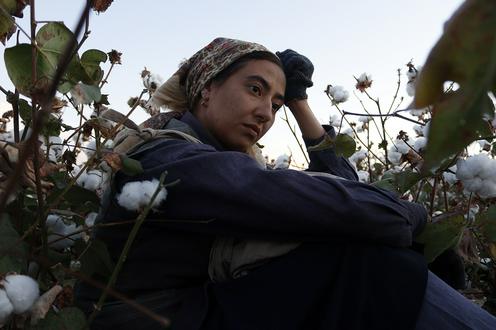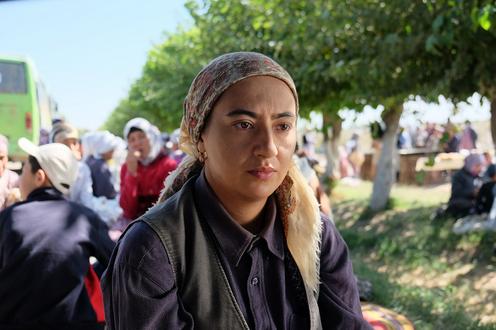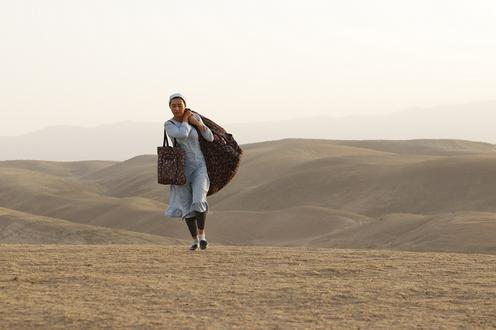The 46th Cairo International Film Festival, taking place from November 12 to 21, will feature the world premiere of “Cotton Wool,” a new film by acclaimed Uzbek director Rashid Malikov. The picture tells the story of a simple rural woman named Gulchekhra, whose life is relentlessly tested by fate. Fergana spoke with the director about his film, the social issues it reflects, and the current state of Uzbek cinema.
A Ticket to Filmmaking
— You graduated from both the Tashkent Medical Institute and VGIK (the Gerasimov Institute of Cinematography in Moscow). The medical degree makes sense — your parents were doctors, and both held academic titles. But how did you end up in film?
— I really did graduate from medical school — I enrolled in 1975 and finished in 1980. First, yes, my parents were doctors, and they strongly encouraged me to follow that path. Second, I was afraid of getting drafted into the army, because the army and I are entirely incompatible.
— As one of my friends used to say, “The army is more combat-ready without me.”
— Something like that. And medical students weren’t drafted — not even for training camps. While studying at the institute, I also played in a music ensemble and took classes in the theater studio of Petr Kleiner. The acting skills I gained there led to a kind of miracle: I was cast in the lead role in a major Uzbekfilm production, Duel Under the Plane Tree. And so, quite unexpectedly, I went from being a medical student to a young film actor. After that, I appeared in several more films — I was even invited to act in Tajikistan.
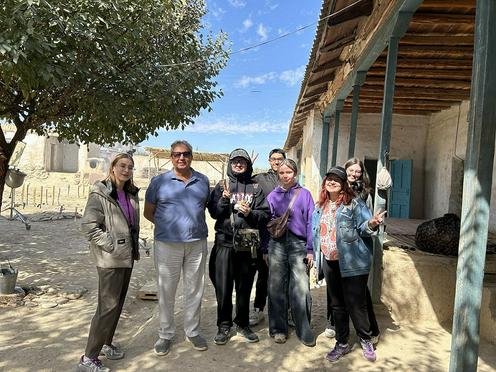 Rashid Malikov and students of his directing workshop at the Tashkent branch of VGIK. Photo courtesy of Rashid Malikov
Rashid Malikov and students of his directing workshop at the Tashkent branch of VGIK. Photo courtesy of Rashid Malikov
— So after graduating from medical school, you realized you didn’t want to be a doctor, but rather an actor?
— Not quite. When I finished medical school, I realized that I didn’t want to be a doctor — that much was clear. But it also turned out that I didn’t want to be an actor either. Around that time, a group came from VGIK to recruit students for Boris Chirkov’s course. It was an acting program. They offered to take me without exams, but I refused outright: no, no, and no — I didn’t want to be an actor. After that, I spent a year as a clinical resident and simultaneously prepared to apply to VGIK — but to the directing faculty. In 1981, I went to Moscow, submitted my documents, passed the exams and interviews, and got into Yuri Nikolaevich Ozerov’s workshop in film directing. That was my second miracle: from being a young doctor, I became a VGIK student, a future director. And that determined the course of my entire life.
There Are Women in Uzbek Villages
— The world premiere of your new film Cotton Wool will take place at the 46th Cairo International Film Festival. Why there?
— That’s handled by my international producer, Diana Ashimova, who is very experienced in these matters. She’s a festival organizer, a selector, and so on. The Cairo festival is one of the 15 forums accredited by FIAPF (the International Federation of Film Producers Associations). These are A-class festivals, along with Cannes, Venice, and Berlin. It was important to us that the world premiere take place at a prestigious festival. That’s a special starting point, which is why we turned down many other festivals for quite some time. After Cairo, of course, we’ll be able to take part in other film forums that, I hope, will prove fruitful for our film.
— In Russian, your film is called Vata (“Cotton Wool”), in Uzbek Paxta, meaning “Cotton,” and in English Cotton as well. But cotton is broader than just cotton wool — raw cotton can be used to make fabric and many other things; it’s even used in explosives. Why did you choose Vata — “Cotton Wool” — as the Russian title?
— Yes, cotton is a general term, and cotton wool is a processed product. For me, it was important that it be cotton wool specifically, because, as you correctly noted, cotton can be used to produce all sorts of things. Here, however, cotton wool has a very utilitarian meaning. Since the late nineteenth century, Uzbekistan has been a cotton-growing country, and cotton processing became a traditional craft for Uzbek women. They would beat it, comb it, wash it, make quilts — kurpacha — and sew padded robes, chapans (a robe-like coat with sleeves). It was one of the few crafts that Uzbek women could practice in villages and even in cities.
This craft is still common today; some women continue to do it the old-fashioned way. But it also carries symbolic weight. When someone works with cotton wool, they seem to see life itself through it — soft, muffled, somewhat blurred. For a time, they don’t notice real problems, can’t discern the horizon of life, don’t fully understand what happens beyond their village. In that sense, Cotton Wool is also a symbolic title.
— After the film’s protagonist, Gulchekhra, is abandoned by her husband and left virtually on the street, even her mother asks her not to come back home so the neighbors won’t bring shame on the family. Why such an attitude?
— To understand the mother’s logic — which may seem heartless toward her daughter’s misfortune — one has to understand the nature of Uzbek rural and urban society, which has remained unchanged for centuries. The mother fears that Gulchekhra’s situation will harm her younger sister, who has yet to be married off. If a woman is left by her husband, the community assumes she must have been a bad wife, and that stigma falls on the entire family.
This reflects a whole complex of prejudices that persist in Uzbek society. They hold back social progress and impede various kinds of innovation — technological, cultural, and humanitarian — especially in rural areas. These are vestiges of centuries-old traditions that change, if at all, only very slowly.
— The mother-in-law’s reproaches toward Gulchekhra for not giving birth to a child for her husband seem to come from the same place.
— Yes, problems arising from childlessness are another widespread legacy that deeply affects families. There’s no such concept as “child-free” here; no one says, “We don’t have kids, well, we’ll just live for ourselves.” If a woman doesn’t give birth, after four or five years of marriage the husband will marry another woman — and no one condemns him for it. If the second wife doesn’t have children either, he’ll take a third. In this system, children are an obligatory attribute of any family, regardless of the circumstances. Whether you can or not — you must have a child, or things will be bad.
And children are often numerous — five, six, seven. Of course, it’s highly desirable to have a boy, because as soon as one is born, the family is seen as complete in the eyes of others. The social pressure placed on a married woman who hasn’t given birth — as if she were somehow incomplete — can be enormous. Even today, women suffer because of this, and families break apart. And this happens not only in remote villages but in major cities, including Tashkent. These attitudes are the cause of countless divorces across the country — it’s a very serious problem.
— A hokimiyat (local government) employee courts Gulchekhra. And although she already knows her husband has not only been unfaithful but has officially divorced her, she still resists the other man’s advances. The heroine finds herself completely alone — without money, shelter, or companionship — yet endures all her misfortunes stoically, breaking down only once, when she cries. Would you say Gulchekhra embodies the ideal traits of an Uzbek woman?
— Yes, you’re right. In my heroine, I wanted to show the best qualities of an Uzbek woman — one who, no matter what happens, continues to live and to find some joy in life. In Uzbek, there’s the word sabr, of Arabic origin, directly connected to Islam. It means patience and the ability to endure life’s hardships. The idea of sabr permeates Uzbek society. It compels people to go on living no matter what. They don’t drink themselves into oblivion, they don’t do anything destructive — they simply bear their burdens patiently. My heroine is the very embodiment of sabr.
And yet Gulchekhra herself is not at all religious. While sabr has Islamic roots, in Uzbek society it has become secular — a commonplace ethical idea.
As for her moral resilience, I’ve seen many women like her. I wanted to portray precisely such a woman — someone who remains a dignified human being despite every hardship life throws her way.
Now, if we turn to the hokimiyat employee, there’s a serious issue there as well. He proposes marriage — but as his second wife. He offers her a nikah (a Muslim marriage contract). Unfortunately, the tradition of second wives has become quite common here. Although technically illegal, more and more men are taking second wives without any thought to the moral consequences. Society does not condemn this — and sometimes even approves, especially if the second wife is a woman in need.
This is a serious social problem, closely tied to the growing influence of religion in our republic. Personally, it troubles and frightens me — particularly considering that Uzbekistan’s southern border runs along Afghanistan, a country still living in the Middle Ages. The idea of a “second wife” is itself a throwback to medieval times. The strengthening of such archaic tendencies is a dangerous trend that could undermine Uzbekistan’s secular, civic society. I do hope, however, that our government will not allow this to happen.
— Do you think art can only call for compassion, or can it actually help a person — serve as a kind of guide to life?
— I’ve always been told that art cannot give answers or instructions — that true art asks questions. My film doesn’t offer any guidance, but it does pose a question: Do you see how we live? This is part of our society. The film doesn’t have dizzying twists and turns, but it shows several very sharp social problems. That’s what I wanted to draw attention to.
Even though the film has been shown in Uzbekistan, these social problems don’t strike local viewers as sharply as they should — and that, I think, is the most frightening thing. People say, “Well, yes, she’s picking cotton — so what? Yes, she’s offered to become a second wife — what’s the big deal? Her husband left her? Of course he did — she had no children.” To me, that’s a deeply misguided reaction and a sign of something wrong. And that’s exactly what I want to show — not only to people in Uzbekistan but to the whole world.
— All right, your film will be seen abroad thanks to the festival circuit. But what about contemporary Uzbek cinema more broadly — is it being sold for international distribution? Does it participate in major festivals?
— No, it isn’t being sold, because the distribution system is completely undeveloped. Yet Uzbek films — especially historical ones — have definite potential. At the very least, they could find audiences in Muslim-majority countries, in the Arab world, or even in places like Malaysia, which is also an Islamic nation. But they aren’t bought simply because there’s no supply — no one is doing this work. No one regularly attends film markets or builds these connections.
There is an international department at Uzbekkino, but they certainly don’t handle this. Naturally, anyone who makes a film thinks it’s a masterpiece worthy of the most prestigious awards. But the international department doesn’t bother much with submitting films to festivals. Occasionally, festivals themselves reach out and ask, “Would you like to send us your film?” — and then, yes, they might send it. But usually these are events in neighboring countries — Tajikistan, Belarus, and so on.
No major festival accredited by FIAPF will ever issue such requests. To reach A-class festivals — or even smaller, respected forums — requires serious effort. So each such screening is more of an exception than the rule.
— And in Uzbekistan itself — do people actually watch Uzbek films?
— It depends on where. Let’s say Uzbekkino produces five to ten feature films a year, intended for theatrical release. But no one watches them for one simple reason: there are no movie theaters. Well, technically there are, but very few — about 20–25 screens in all of Tashkent, and just one state-run multiplex in the entire country. That’s nothing. So there’s simply nowhere to show Uzbek films. As a result, within a month or two they end up on state or private TV channels. In other words, feature films made for cinemas become television films — and that’s been the case for at least thirty years.
Which raises the question: why make feature films designed for theatrical release at all? Maybe Uzbekkino should produce TV movies or long, high-quality series instead. But no — they continue making feature films that no one ever sees on the big screen. That’s the paradox.
— Is filmmaking in Uzbekistan funded only by the state, or do private investors participate too?
— No, private investors have turned away from cinema. They understand that no matter how much they invest in a feature film, they’ll never make the money back under current conditions. Although, as everywhere, there are exceptions.
I recently spoke with a film distributor who owns a chain of cinemas. Naturally, he screens only American films — they bring in revenue, while Uzbek films bring in nothing. He told me that for a film to break even in Uzbekistan, its budget can’t exceed $40,000. Only then, maybe, could it recover its costs. But it’s impossible to make a real film for that amount — only a TV movie or something of that sort. (A “TV movie” is a short television series of two to four episodes with a small number of locations.)
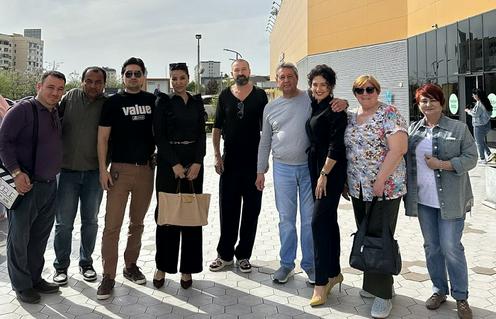 Rashid Malikov, cinematographer Boris Litovchenko, and part of the film crew. Photo courtesy of Rashid Malikov
Rashid Malikov, cinematographer Boris Litovchenko, and part of the film crew. Photo courtesy of Rashid Malikov
— And how much do film industry workers in Uzbekistan earn these days? What are the lower and upper pay ranges?
— If someone works on a state-funded production, there’s no variation at all. There are fixed rates that make no distinction between an established director and a beginner. Experience, skill, reputation — none of that matters. The only thing slightly considered is the complexity of the production. But if a debutant and I both make a film based on the same script, we receive exactly the same amount. For a newcomer, that sum might seem enormous; for me, it raises the question of whether I’m even in the right profession.
For instance, according to Uzbekkino’s official rates, a director’s fee is about $7,000–8,000. I’ve raised this issue many times — there can’t be a single pay scale for everyone. Everything should be differentiated. Directors differ enormously in level and quality. Around the world — including in Kazakhstan and Russia — directors aren’t forced into a Procrustean bed of fixed rates; their fees are negotiated.
Of course, $7,000–8,000 may sound like a lot to some. But that has to be spread over 10–12 months — the usual production period for a film. Others earn even less. For example, Uzbek actors make around $20–25 a day, and that rate hasn’t changed in decades.
— What, in your view, does Uzbek cinema lack compared to Hollywood, or even to the best examples of Soviet filmmaking?
— Compared to Hollywood, we have nothing — we lack everything. First and foremost, good screenplays that could genuinely engage audiences; skilled cinematographers; directors capable of telling a story clearly. And, of course, a functioning system of distribution and exhibition. No matter which part of the production and distribution chain you look at, we’re not just behind — in some respects, we simply don’t exist. So comparing us to Hollywood makes no sense. Compared to Soviet cinema, perhaps — some of our films might reach that level, but they’re very few.
— Still, how do you see the future of Uzbek cinema overall — with hope or pessimism?
— Of course, I look at Uzbek cinema with optimism and hope, because I’m part of it. I’ve filmed in Tajikistan, Kazan, and Moscow, but most of my work has been at Uzbekfilm. And I very much hope that, despite everything, Uzbek cinema will continue to develop. Maybe not as energetically as I’d like, and not as fast as in Kazakhstan or Russia — we’re still lagging behind them. But I believe we’ll gradually make up that gap and become a strong and successful film industry in Central Asia.
To achieve that, we simply need to move to a market-based system. Russia and Kazakhstan did that long ago — and they’ve achieved visible success. Our industry is still administrative, bureaucratic, run by orders. But once we shift to a real market model, I believe Uzbek cinema will truly flourish.
-
 05 February05.02The “Guardian” of Old Tashkent Has Passed AwayRenowned local historian and popularizer of Uzbekistan’s history Boris Anatolyevich Golender dies
05 February05.02The “Guardian” of Old Tashkent Has Passed AwayRenowned local historian and popularizer of Uzbekistan’s history Boris Anatolyevich Golender dies -
 23 December23.12PhotoTokyo DriveJapan to invest about $20 billion in projects across Central Asia over five years
23 December23.12PhotoTokyo DriveJapan to invest about $20 billion in projects across Central Asia over five years -
 17 December17.12Sake for SixCentral Asia’s Rapprochement with Japan Comes with Hidden Pitfalls
17 December17.12Sake for SixCentral Asia’s Rapprochement with Japan Comes with Hidden Pitfalls -
 24 November24.11Here’s a New TurnRussian Scientists Revive the Plan to Irrigate Central Asia Using Siberian Rivers
24 November24.11Here’s a New TurnRussian Scientists Revive the Plan to Irrigate Central Asia Using Siberian Rivers -
 22 October22.10Older Than the Eternal CityWhat has Samarkand accomplished in its three thousand years of existence?
22 October22.10Older Than the Eternal CityWhat has Samarkand accomplished in its three thousand years of existence? -
 26 September26.09PhotoA Close-Up of the BazaarPhoto Tour of the Fergana Valley with Anzor Bukharsky
26 September26.09PhotoA Close-Up of the BazaarPhoto Tour of the Fergana Valley with Anzor Bukharsky
